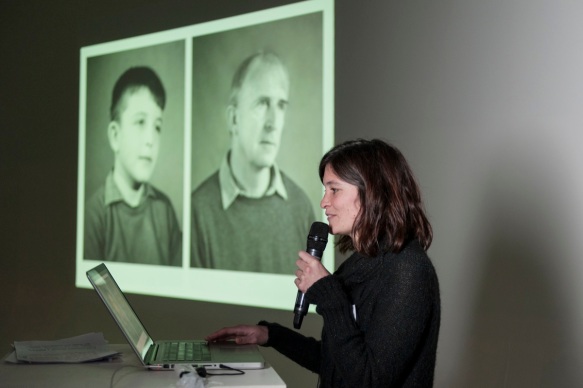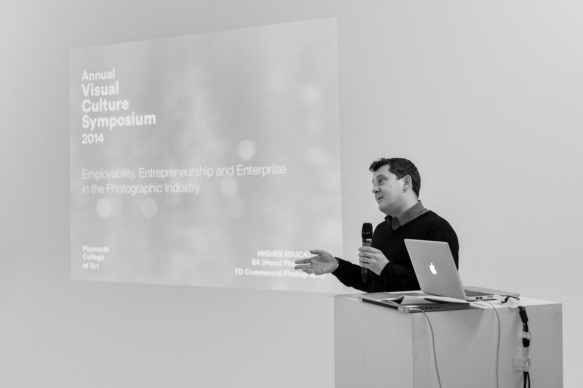Photography students and staff from Plymouth College of Art travelled to London recently to attend the annual Visual Culture Symposium, held this year at the White Rabbit Studios in Shoreditch.

It was a fantastic opportunity for students at all levels of the degree programme to hear from creative professionals out working in the industry and finding different ways to carve their careers and fund their passion. To have such a diverse range of speakers provided a refreshing insight into all aspects of the discipline and it was well planned to cater for all interests – whether that be high end commercial photography to working in artistic spaces through curatorial practice.
With photography being such an accessible medium to everyone it has previously struggled to gain the recognition it deserves as a career path, however in our increasingly visually literate culture the creative industry is always expanding.
As programme leader Tim Gundry highlighted in the introductory speech, with thousands of new graduates leaving photographic education every year, those wishing to pursue careers in the industry must adapt to face a number of challenges. In addition to being self-sufficient, highly motivated, and determined to succeed, graduates need to acquire a range of skills and be able to adapt to the demands of the global knowledge economy.

Clarisse d’Arcimoles presents her work.
However the whole tone of the day was very positive with each speaker reiterating that the work is out there as long as you are actively searching and using your passion constructively. Photographic programmes in education can open so many doors to careers, and not all are necessarily based behind the camera.
Jason Shenai runs Millennium Images, seeking out new talent within contemporary photography. And Bridget Coaker spoke about her experience working in galleries, her position as picture editor for the Guardian and setting up Troika Editions.
We also heard from some working photographers such as Patrick Ford whose focus is within the commercial field. As with other professionals he emphasised that with such a lot of competition the key is to be confident and really clear about what you do; create a continuity about your work.
A lot of practitioners showcased their use of film within their work. Combining these two disciplines is something that is more and more sought after by clients. After doing a photography degree it is a given expectation to be a good photographer, so extra skills are always in demand and will enhance your profile.
Fine art photographer Emma Critchley offered advice on how to create and fund your work through competitions, bursaries and residencies. This was an area that was highlighted frequently throughout the day; there are many resources available to creative people and we are fortunate enough to already be exposed to many of these through our programme information.

Portfolio reviews were available to students.
Between talks the speakers chatted with students and some were kind enough to stay at the end of the day for further portfolio reviews. To have your work critiqued by professionals was a great opportunity; to be advised on how best to enhance and present your work and to also question its meaning and effectiveness.
Overall the day was a great success. For the 1st and 2nd years it was a chance to see where the rest of their studies could potentially take them and for the 3rd years, an encouraging insight into the professional sphere that awaits us after graduation. There is a lot of competition out there today but I believe that we all left with a sense of confidence that working hard and being flexible with goals can lead into many different possibilities within the creative field.

Course leader Tim Gundry introducing the event.
Many thanks go out to the photography team, especially programme leader Tim Gundry for making this event possible.
-Jennifer-Anne
All images ©Nicholas White
